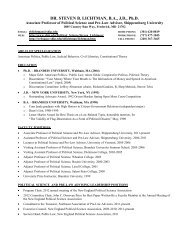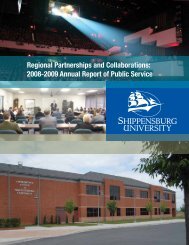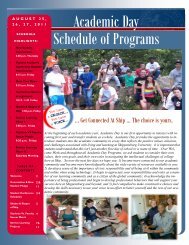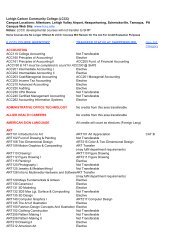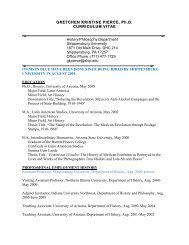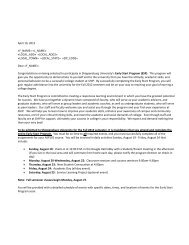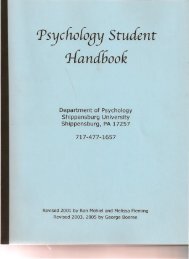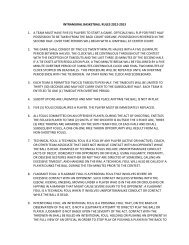Beatrice Marelli: Irrigation Systems and Values 33water has particularities with respect to other assetsthey use for farming, such as seed and the land, whichthey do not perceive as the same issue of scarcity andurgency. Indistinctly all the farmers have noticed areduction in the availability of water during the pasttwo decades due to significant changes in agriculturalpractices that have brought a transformation in the waycommon pool resources are more generally used. Theconsortia themselves began as traditional agriculturalvillages where crops were combined and planted inrotation in order to maximize soil fertility and cropyield. During that time, the farmers paid consistentattention to the water channels: they were cleanedmonthly, and the water patterns were monitored tomake sure excess water was flowing into undergroundcisterns to provide for future uses. However, a shiftoccurred in the consortia conception of common poolresource in the 1980s when the European Unionpursued a decision to subsidize corn crops, causing cornprices to outpace those of other crops. Following therational calculations of many other consortia in Italyand the rest of Europe, these two communities endedrotation practices and shifted to a monoculture of corn.As this culture requires water primarily from May tothe first half of August when crops are ready, Farfengastopped monitoring the water channels for the restof the year to make sure water was flowing properlyand being appropriately stored by the cistern system.Whereas natural springs and streams had previouslybeen sufficient to irrigate every field in the village, theintensive use of water from May to August necessitatedthe construction of two new wells, respectively in thelate 1980s and late 1990s. The unsustainable waterusage persisted, causing the first well to run dry in thefirst decade of the corn monoculture, and the secondwell is currently in a state of serious depletion. Farmersare also planting more seeds to increase corn yields, soeach field requires more water during peak season.Due to these conditions, all Farfenga farmers areexperiencing scarcity. However, their approach to thesituation varies from household to household: somefarmers recognize scarcity as a serious problem andwish to alter usage patterns accordingly, others donot acknowledge it as a concern and do not wish toalter usage. 1 It is important to recognize the farmers’attitudes about water management are not related totheir own water problems: some farmers face scarcityall year and do not wish to alter usage patterns, whileothers who do wish to initiate new practices are not yetfacing year-round scarcity.Farfenga has experienced a social environment basedon local leaders who have brought the institution topursue selfish appeals instead of common outcomes.In this group, members have very little trust in theconsortium or the board of representatives, even ifelected by themselves. 2 This appears to be strictlylinked with the recent history of corruption thisgroup has faced, in turn related to selfish behavioursjust mentioned: leaders took advantage of powerpositions for rent-seeking for a long time. This brokethe trustworthiness among the community members,sharing suspicion instead of building networks ofmutual support and approval among the users.In the Gabbiana consortium, farmers did not stopeither the constant maintenance of the channels ordeveloping water allocation procedures. The grouphas experienced a higher level of trust, probably dueto the presence of individual attributes of a differentkind among community members and representatives.A common sense of awareness has been noticed aboutthe mutual benefits of trustworthiness, as well ashigher attention and investment in social networksthat have allowed the community to establish itsinstitutional development on trust basis. 3 Theseprofitable expectations regarding other people’sbehaviour could be grounded in both the individual andthe group levels. We found positive past experiencessuch as mutual adherence to agreements and successfulconclusions of consortium activities have enabledmembers to learn from socialization how to invest morein the community 4 . In turn, these identities the farmersintentionally created through their own behaviourshave helped an internalization of common values andsocial norms found extremely well shared among allGabbiana members. It has been recognized that ahigh level of mutual understanding regarding normsviolations probably was generated on the same wellestablishedtrust bases of the community. This has ledto a better sense of affiliation and awareness of respectfor the group, with a strong feeling of responsibility bythe single user for the common. Water streams evenceased to be just an instrument of profit and becamea source of sharing identities: “We have to understandthat the channel is ours, it is made by us, and we arethat channel.” 5Discussion and conclusionsWhy have these communities performed in suchdifferent ways over time? According to the discussedhypothesis, at the base of the institutional performance,there are internal and shared values that mark farmerswhile they are managing natural resources. The maingoal of these case studies has been to show the rolethat internal and shared values play in the processof institutional construction for water management.In the empirical analysis a positive relationshipexists between the achievement of sustainability ofthe institutional arrangements and the presence ofvalues connected with altruistic behaviours in selfgoverningirrigation systems. These values are vehiclesof collective learning and foundations of social orderinside the community of users, as well as instrumentsof consciousness regarding the necessary institutionaladaptation and flexibility. However, opportunisticbehaviour is very likely to be found in communities ofthis kind. According to Repetto (1986), inevitably most
34 PROTEUS: A Journal of Ideasof the available rents are captured by those with power,influence, and wealth, and rent-seekers think using theresource efficiently is much less important than gainingcontrol of the allocation mechanism. Institutional rulesthat require irrigators to cover the cost of operatingand maintaining their systems and to contribute to therecovery of the initial investment in the institution,could help contain rent-seeking behaviours. However,that process could also be extremely challenging asthe Farfenga group showed. The norms applied ininformal relationships and used in cultural traditionare forms of a shared knowledge and as such implicitlyfostered by an innermost circle. This process ofinternal-values establishment with positive outcomeshas not been achieved in the Farfenga case. The mainreason could reside in the features of the internalvalues of the community members. Data show a clearpreference by these farmers towards selfish behavioursand attitudes, carried out in a short-time view of theexploitation process. Not seeing a common and sharedbenefit in cooperation, members’ inability of dialogueand deficiency of reciprocity made the institutioncollapse. Where substantial temptation to engage inopportunistic behaviour does exist, no set of rules willbe self-organized (Ostrom V. 1980). In such regard, thepresent research found the existence of a common setof internal values is useful in increasing the institutionalperformance and in controlling opportunisticbehaviours. If participants do not view the specificrules crafted to organize a particular irrigation systemas being appropriate, a behaviour that violates acceptednorms may not be sanctioned.As in the Farfenga case, if a formal structure isviewed as illegitimate, behaviour that undercuts themaintenance of that structure will not be viewed withdisapprobation. Consequently, if opportunism becomesthe dominant mode of behaviour in irrigation systems,ultimately all users will be hurt. When institutionsare well crafted, opportunism can be substantiallyreduced, and even if the temptations can never betotally eliminated, they can be held in check. Moreover,the data brought evidence that the existence of a smallnumber of social actors with Kantian aspects in ruralirrigation groups has remarkable effects on overcomingcollective action problems.In the Gabbiana case, farmers did not stop eitherthe constant maintenance of the channels or developingwater allocation procedures. The reason seems to residein a shared awareness regarding responsibilities onthe part of the whole community with regard to theresource, as well as personal exposure of long-termplanning among them. In particular, the person calledto supervise stream maintenance has had a key role inthis consciousness of the whole group about the needfor constant attention to water infrastructures. He hasbeen able to recognize the channels were as importanta resource as the water itself. As a consequence, hehas directed his efforts on activities, given for free,whose objective was to ensure an optimal level ofstream preservation over time. This sort of innovatorhas helped the community to overcome short-termexploitation of the resource, bringing it toward a moregeneral level of consciousness about needs of sharingcommunitarian values among farmers. In his ownbehaviour, he clearly shows Kantian aspects, as well as astrong consistency with Boudon’s axiological rationality.As Gabbiana case shows, in order to decreaseopportunistic behaviours community members needto invest voluntarily in coordination activities suchas monitoring and sanctioning, along with constantirrigation channel maintenance. Coordination couldbe achieved by learning how to do joint tasks better, byassigning one person the responsibility to be in chargeof other users, and by establishing a rule specifyinghow particular activities are to be undertaken, alongwith establishing how that same rule is monitored andenforced by participants, external enforcements, orboth.This research stressed the existence of a commonset of values is extremely useful in increasingthe institutional performance and in controllingopportunistic behaviours. An important point torecognize is that genuine trustworthiness, i.e. theindividual preferences consistent with conditionalcooperation, is an independent and non-reduciblereason for explaining how communities achieveenvironmental preservation. Trust is the most powerfulinstrument of connection between institutionalarrangements and values. It is enhanced whenindividuals are trustworthy, networked with oneanother, and acting within institutions that rewardhonest behaviours (Marshall 2005).The present results also support Ostrom’s (1998,1999) idea of a core relationship existing among trust,reputation, and reciprocity. It has been determinate,indeed, that those factors are dependent on thecommunity’s past experiences and on the capacity oftheir members to recognize a major common interestin preserving the resources. Once in place, those factorsenhance the capacity of a community to govern itsenvironment and, in particular, to foster the process ofinstitutional adaptation that is necessary for a long termmanagement of water resources.



